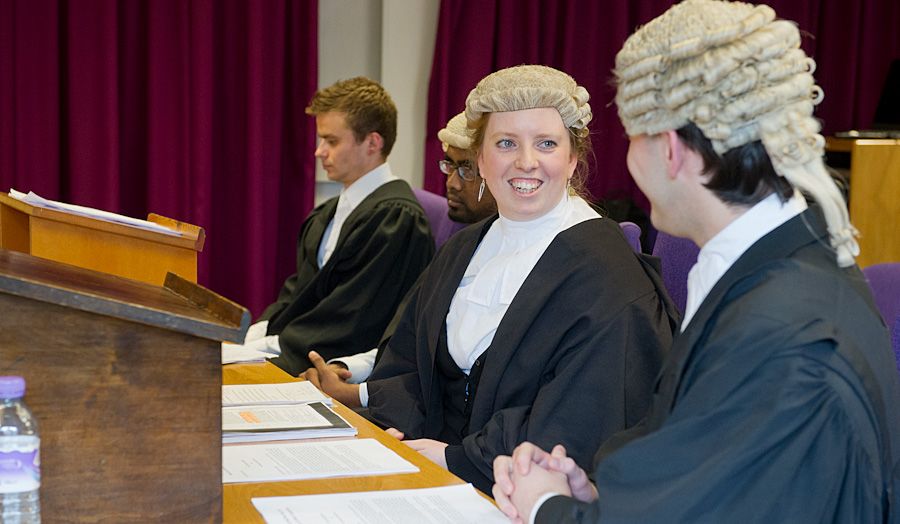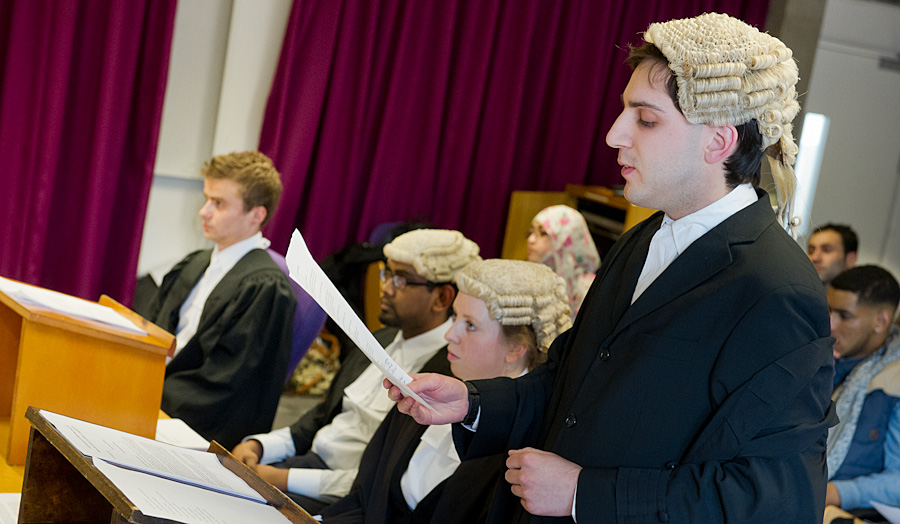Are you interested in becoming a solicitor or barrister? Or maybe you want to study law and advocacy, but not actually practise in the industry. With so many options, it’s easy to feel lost but don’t worry, we’re here to help.
We understand that finding the right law course can be difficult, especially if you’re not sure where to start. That’s why we’ve put together this handy guide to get you started.
Undergraduate law degrees
We have two types of undergraduate law degrees:
- BA (Hons) law degrees
- LLB (Hons) law degrees
In this guide, we'll explain the difference between both and the types of careers each could potentially lead to.
Applying for January 2023
If you're a UK student or an EU student with settled or pre-settled status applying for January 2023, you can simply call our hotline on 0800 032 4441 or complete our fast-track online application form.
Applying for September 2023
If you're a UK applicant wanting to study full-time starting in September, you must apply via UCAS unless otherwise specified. If you're an international applicant wanting to study full-time, you can choose to apply via UCAS or directly to the University.
If you're applying for part-time study, you should apply directly to the University. If you require a Student visa, please be aware that you will not be able to study as a part-time student at undergraduate level.
If you're applying for a degree starting in January/February, you can apply directly to the University.
A lawyer is a person who practises law, either as a solicitor or a barrister. To become a lawyer you’ll need to complete a postgraduate course.
Let’s take a deeper dive into the routes you can take to become a solicitor or barrister.
To become a solicitor, you’ll need an undergraduate degree, but it doesn’t necessarily have to be in law or an LLB law degree. In addition, you’ll need to complete the Solicitors Qualifying Examination (SQE), which is the new centralised assessment for anyone who wants to qualify as a solicitor. This regime was previously known as a Legal Practice Course (LPC).
The LPC is still running presently but will only be available to students who have already started their law degree.
Unlike in previous years, if you have a non-law related undergraduate degree you don’t need to undertake a Graduate Diploma in Law (e.g. the Common Professional Exam (CPE)) in order to qualify as a solicitor.
The SQE is the new training regime for becoming a solicitor. The previous route, known as a Legal Practice Course, will eventually be phased out. It’s centrally managed by educational establishment KAPLAN Higher Education.
The first SQE assessment is a 180 question multiple choice exam that covers basic law and elements of legal practice. The second assessment is not multiple choice, instead focusing on the practical elements of law such as drafting, interviewing and advocacy.
After, before or during these assessments, you’ll need to complete the practical element of the SQE. You need to prove that you have completed two years of qualifying work experience, but this can be consultancy-based or even voluntary work with an organisation such as the Citizens Advice. Your legal practice experience doesn’t have to be two consecutive years and can be submitted as a portfolio, so long as it has been signed off by no more than four fully-qualified solicitors.
Theoretically, it should be cheaper to do the Solicitors Qualifying Examination (SQE) as there’s no requirement to pay for a training course. The average price for the SQE exam is between £4,000 and £6,000. However, it’s worth noting that without completing a training course or understanding the foundations of law, it’s unlikely that you’ll pass.
Also, you must pay each time you take each exam, unlike a Legal Practice Course (LPC) where you have three chances to pass, included in the fee.
To become a barrister, you’ll need an undergraduate law degree. This doesn’t necessarily have to be an LLB (Hons) law degree.
If you have a bachelor’s degree in any other subject than law, you’ll need to complete a Common Professional Exam, otherwise known as a Graduate Diploma in Law. This is typically a one-year course, if studied full-time, or longer if studied part-time. After this, you’ll need to complete a Bar Practice Course and then go on to complete a barrister apprenticeship (called a pupillage), which is the first part of work experience that’s essential to qualifying as a barrister.
If you have an LLB undergraduate degree, you don’t need to complete a Common Professional Exam or Graduate Diploma in Law. Instead you can skip straight to completing one of the Bar Practice Courses available at various institutions.
From September 2021, the Solicitors Qualifying Examination (SQE) is being phased in. This is the new centralised way to qualify as a solicitor in England and Wales.
Eventually it won’t be possible to become a solicitor by completing a Legal Practice Course such as an LLM, and the only route to becoming a solicitor will be via an SQE.
For postgraduate study, you can still choose to become a solicitor via the LPC route if, on, or before 31 August 2021 you had completed, started, accepted an offer, or paid a deposit
for either:
- a Common Professional Exam/GDL Course
- an LPC
For undergraduate study, if you’re an LLB student, you can still choose to complete the LPC and become a qualified solicitor if, on, or before 21 September 2021, you had completed, started, accepted an offer, or paid a non-refundable deposit for the LLB.
Please note, the courses must start on or before 31 Dec 2021.
If you’ve already started an LLB law degree, Graduate Diploma in Law, or a training contract, don’t worry. There will be transition arrangements in place until 31 December 2032 to help you qualify as a solicitor under the current routes. The only condition is that the courses still need to remain available.






